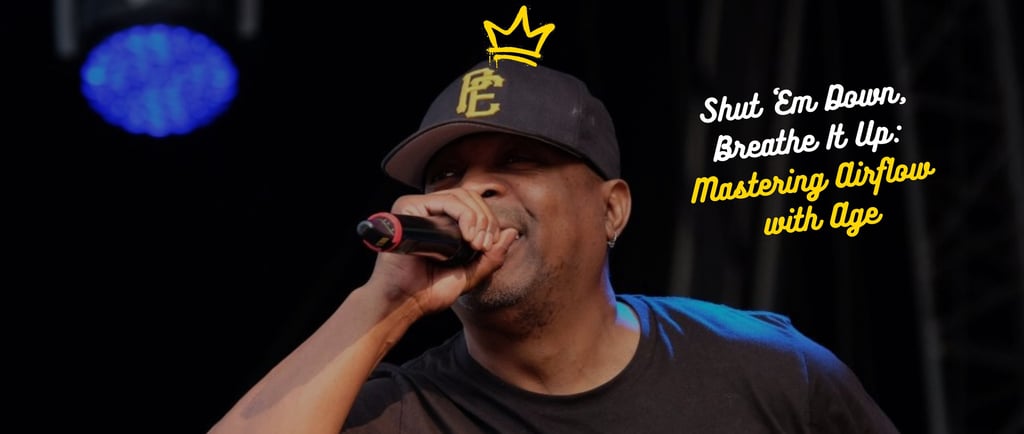Shut 'Em Down, Breathe It Up: Mastering Airflow With Age
As we age, breath control naturally declines—impacting performance for rappers, singers, and vocal artists. But that doesn’t mean you have to lose your edge. In this blog, we break down why breath control changes over time and how you can train smarter to keep your endurance, power, and voice sharp well into the future.
BREATH CONTROLAGE
dj miss kittie
5/15/20253 min read


How Breath Control Changes with Age & How to Adapt
Breath control is essential for rappers and singers, but as we age, our lung function naturally declines, affecting endurance, power, and breath efficiency. The good news? You can train your breath control to counteract these changes and continue performing at your best. Let’s break down how breath control changes over time and what you can do to adapt.
1. How Age Affects Breath Control
Why Breath Control Declines with Age
As you get older, your lungs, diaphragm, and overall respiratory system undergo natural changes that can make it harder to control your breath.
Key Changes That Impact Breath Control:
Reduced Lung Capacity: The lungs lose elasticity, making it harder to take deep breaths and sustain long notes.
Weakened Diaphragm & Core Muscles: The diaphragm naturally weakens over time, affecting breath support and endurance.
Slower Oxygen Exchange: The body becomes less efficient at delivering oxygen to muscles, leading to faster fatigue.
Fact: Research shows that lung function starts to decline around age 30, with a gradual reduction in VO2 max (oxygen utilization capacity) over time.
2. Signs of Declining Breath Control
How to Know If Age is Affecting Your Breath Control
Even if you’re still performing regularly, you may start to notice these signs:
Shorter breath phrases – You can’t hold notes or rap long verses as easily.
More frequent breaths – You need to inhale more often during performances.
Reduced vocal power – Your voice sounds weaker or loses energy faster.
Slower recovery after exertion – It takes longer to catch your breath after intense verses or stage movement.
Tip: If you’re noticing these signs, it’s time to adjust your breath training to counteract the effects of aging.
3. How to Adapt & Improve Breath Control as You Age
1. Strengthen Your Diaphragm with Breath Training
Diaphragmatic Breathing: Practice deep belly breathing to keep your diaphragm strong.
Straw Breathing: Use a straw to create resistance when inhaling/exhaling, strengthening lung muscles.
Pursed-Lip Breathing: Inhale deeply through the nose, then exhale slowly through pursed lips—this increases lung efficiency.
Tip: Perform these exercises daily for 5-10 minutes to maintain and improve breath control.
2. Incorporate Cardiovascular Training for Lung Health
Steady-State Cardio: Running, cycling, and swimming help improve VO2 max, keeping your lungs efficient.
HIIT Workouts: High-intensity intervals mimic performance breathing, improving recovery time.
Breath-Hold Training: Walk or jog while holding your breath for a few steps to increase lung capacity.
Tip: Aim for 3-5 cardio sessions per week to slow down lung function decline.
3. Support Breath Control with Nutrition & Supplements
NAC & Beetroot: Help improve oxygen flow and lung efficiency.
Iron & Vitamin B12: Prevent low oxygen transport, which can cause breathlessness.
Hydration: Keeps vocal cords and airways clear for smooth breath transitions.
Tip: Stay hydrated and eat oxygen-boosting foods like leafy greens, lean proteins, and antioxidant-rich fruits.
4. Improve Recovery & Sleep for Better Breath Control
Sleep Apnea Management: If you wake up gasping or feel tired despite sleep, check for sleep apnea—it can drastically affect breath control.
Breath Recovery Drills: After intense training or performances, practice controlled breathing to reset your breath faster.
Stretching & Mobility Work: Keeps ribcage and diaphragm flexible for better breath expansion.
Tip: Aim for 7-9 hours of quality sleep to allow your respiratory system to recover properly
5. Best Practices to Maintain Strong Breath Control as You Age
1. Train Breath Control Daily: Short, focused breath exercises help maintain lung function.
2. Stay Active with Cardio & Strength Training: Keeps your lungs and core muscles in top shape.
3. Monitor Oxygen Levels: Consider tracking VO2 max with a fitness tracker or periodic lab tests.
4. Adjust Your Performance Approach: Plan breath breaks in verses, warm up longer, and stay hydrated on stage.
The Bottom Line: Age Doesn’t Have to Limit Your Breath Control
While aging naturally affects breath control, you can take action to maintain and even improve your lung function over time. By training your diaphragm, staying active, and optimizing your nutrition, you can continue delivering powerful performances with strong, sustained breath control.
